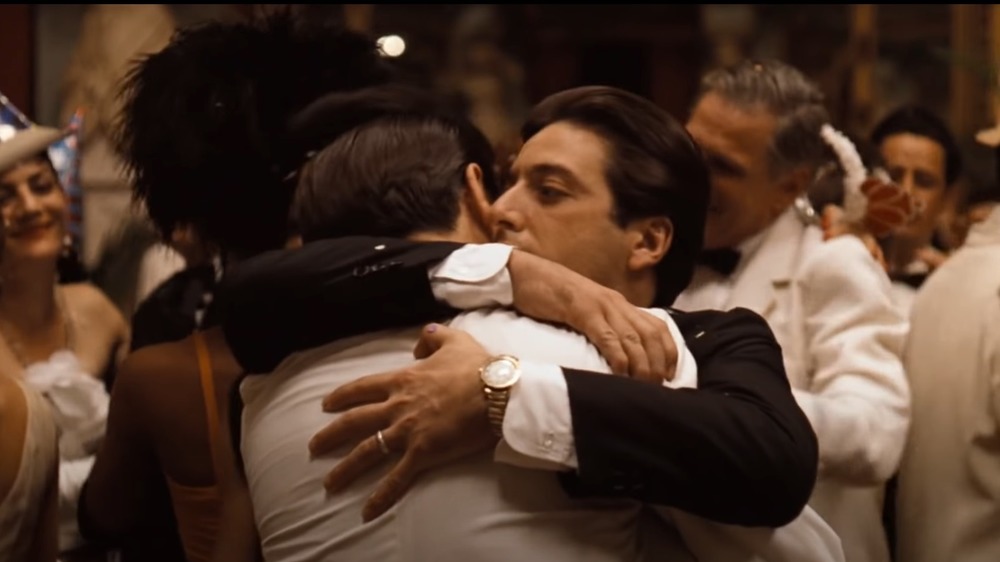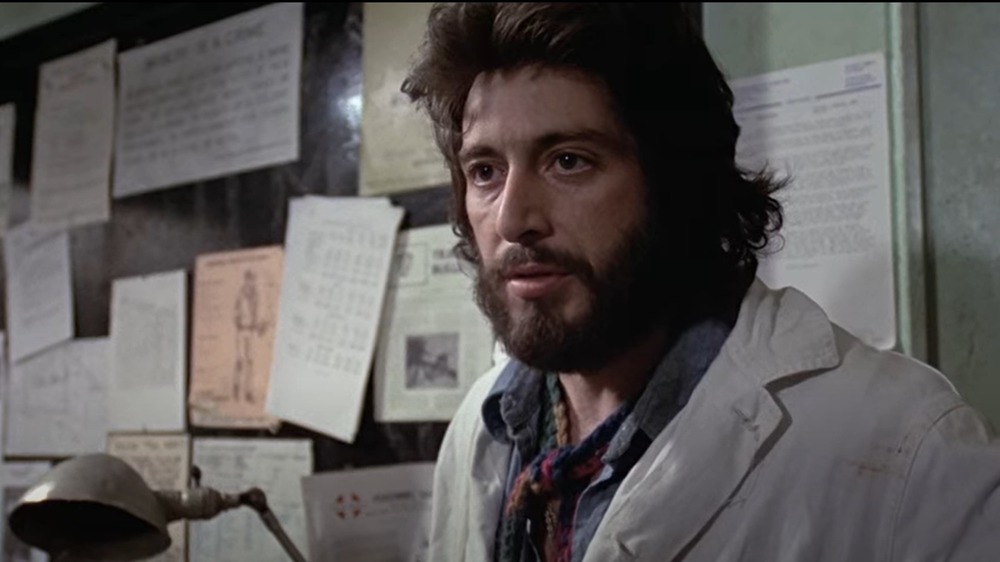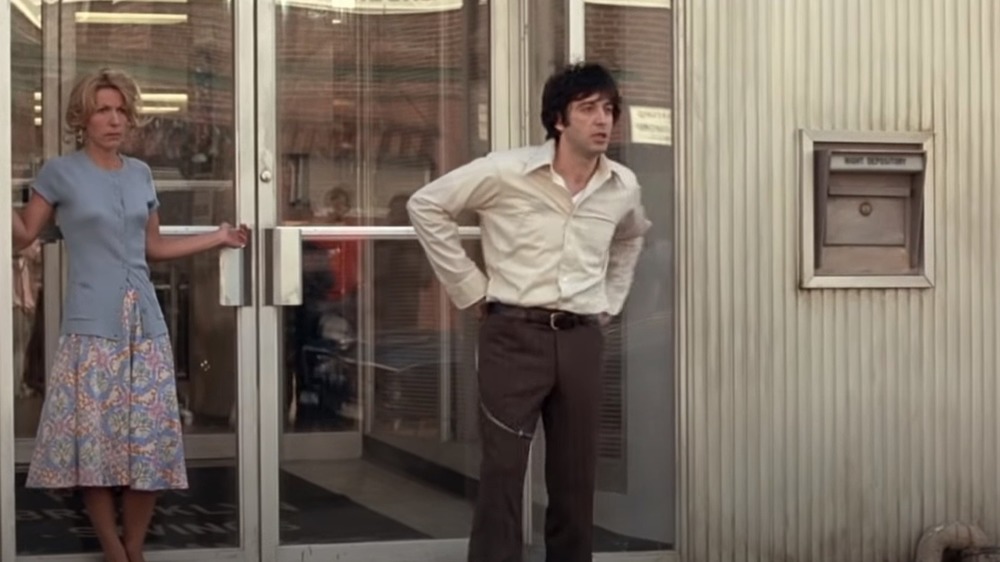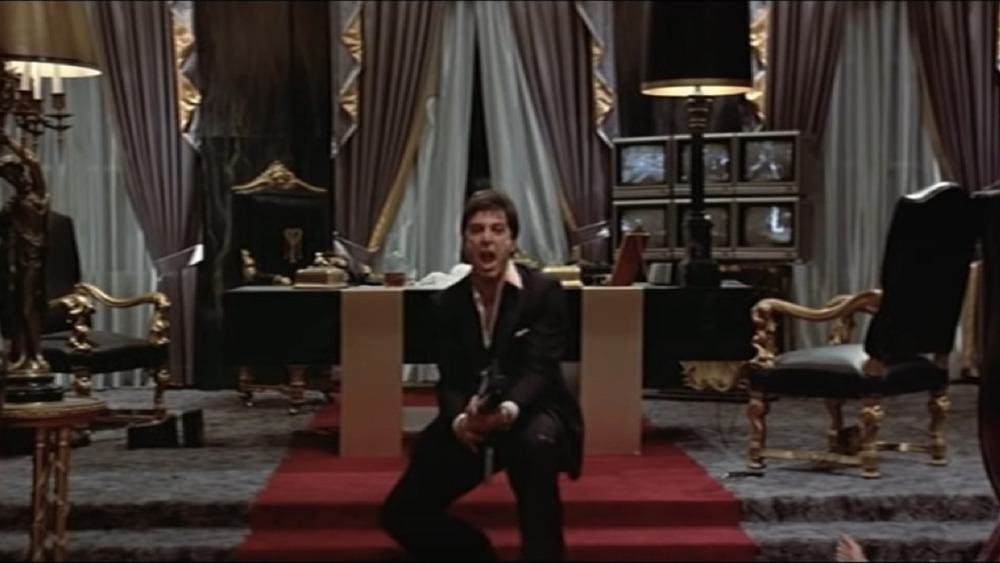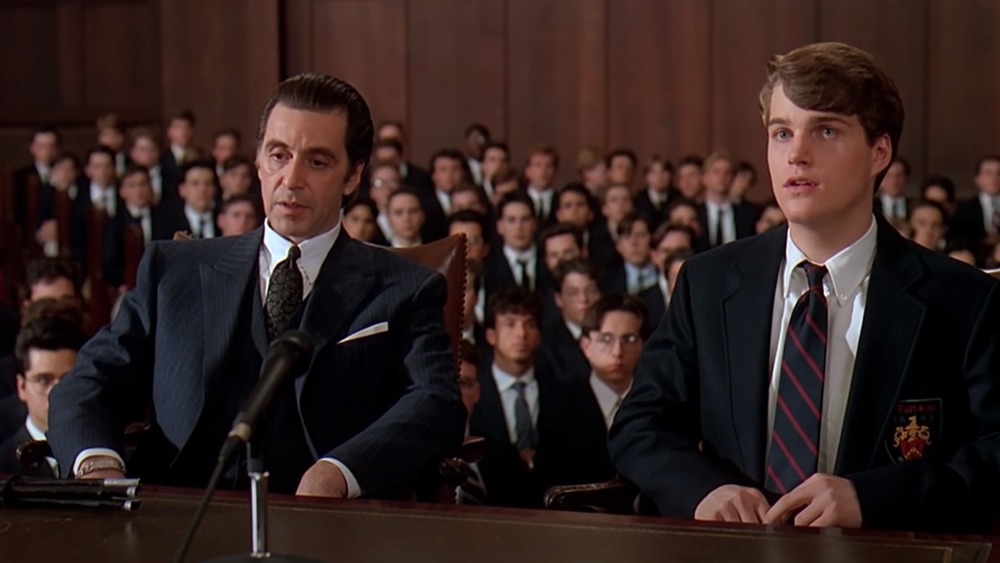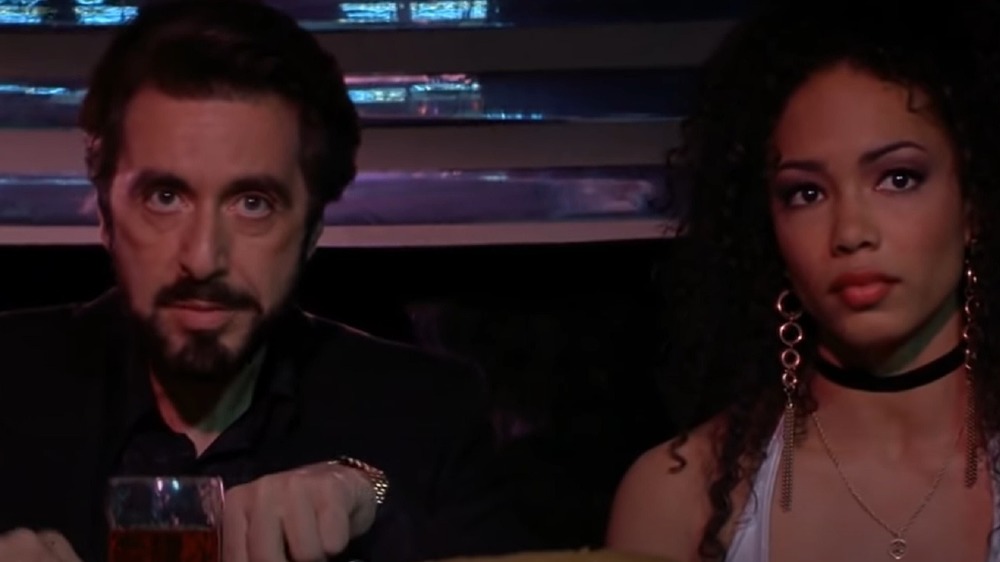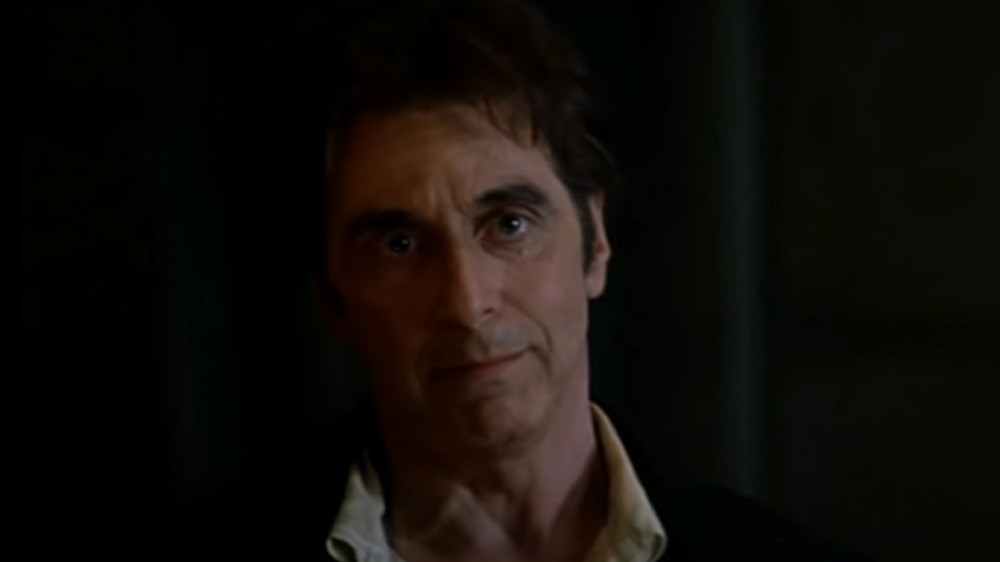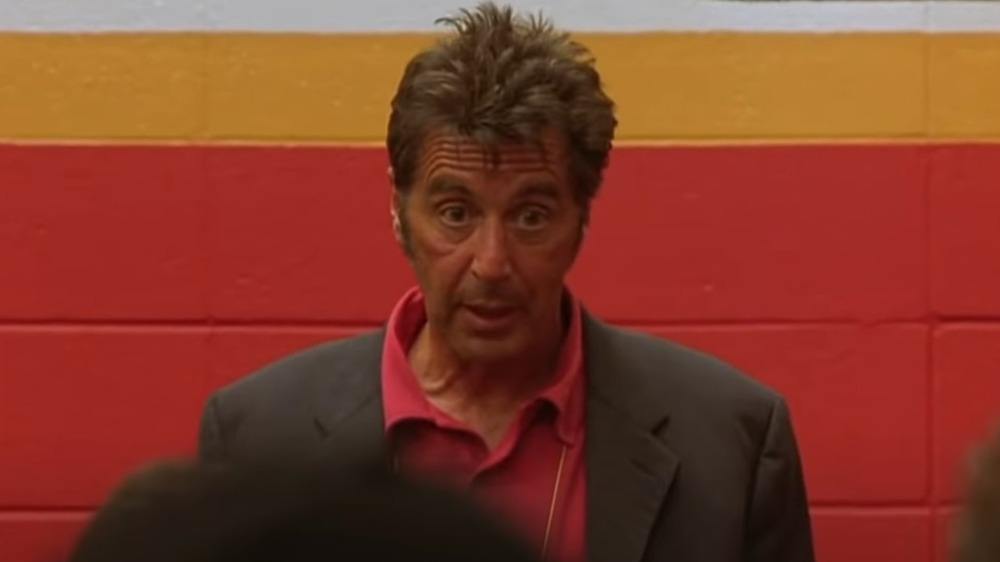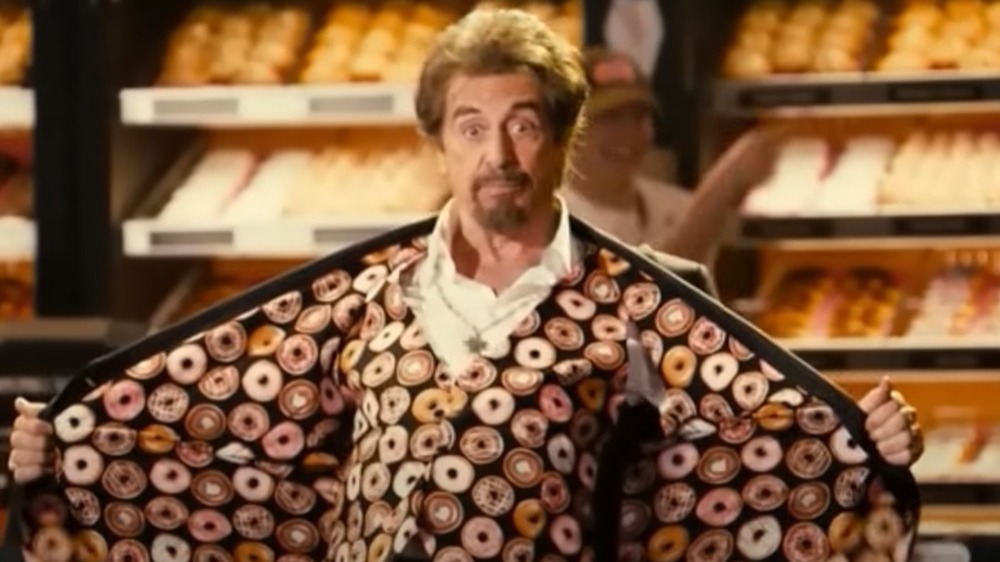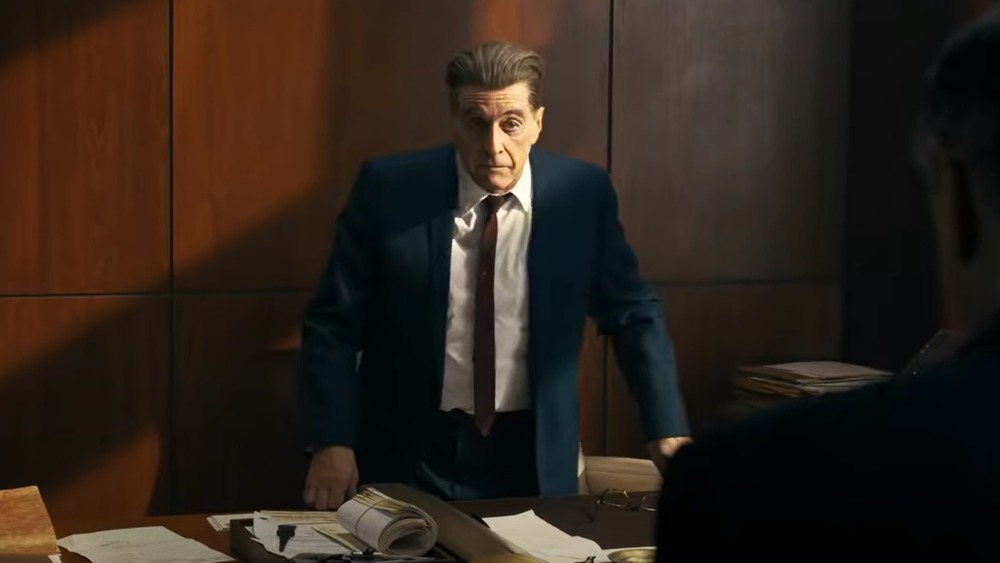Al Pacino's Most Iconic Scenes
This content was paid for by Netflix and created by Looper.
Al Pacino is the definition of a Hollywood legend. The actor has had the kind of career that others in the business can only dream of, with dozens of celebrated performances and so many classic lines that even the most casual film fan can quote offhand with gusto. With one Oscar win under his belt, along with eight other nominations and several Golden Globe and Emmy wins, Pacino is one of the most decorated actors in history, and he's maintained his star power for five decades.
Pacino's filmography is so stacked with seminal pieces of cinema that just about every one of his performances could be categorized as classic, and generations of actors have studied his film performances for inspiration and lessons on technique. So to celebrate the incredible career of Al Pacino, here's a look back at some of his most iconic scenes of all time.
The Godfather: Part II - "I know it was you"
Pacino's role as Michael Corleone in the Godfather film series made him an instant A-lister and netted him both his first and third Oscar nominations. The trilogy presents a number of unforgettable moments that make it into many highlights reels. In the first film, a baptism ceremony serves as the delicate backdrop for Michael's violent ascension to the status of don of his crime family. In Part III, he famously realizes he'll never escape his life of crime, regretfully declaring, "Just when I thought I was out, they pull me back in."
Perhaps the moment that merits the most emulation, though, comes in Part II, when he confronts his older brother Fredo (John Cazale), whose disloyalty to the family has long been suspected by Michael but is confirmed when he accidentally reveals his connection to an assassination attempt on Michael's life. Michael offers Fredo a warm embrace but reveals in a whisper that he knows Fredo has betrayed Michael and nearly got him killed. His kiss is not that of a brother greeting his blood; it's a bitter warning of the revenge still to come, and it shows off Pacino's ability to exert a range of emotions with little more than a stern look and a cryptic line.
Serpico - "Empty your pockets"
In Sidney Lumet's gripping 1973 biopic Serpico, Al Pacino stars in the lead as Frank Serpico, a role based upon the real-life police officer of the same name who uncovered several layers of systemic corruption in the New York Police Department, leading to the establishment of the Knapp Commission. The film follows Serpico as he endures the painstaking process of witnessing, reporting, and then running undercover observations of his own teammates as they engage in illegal enterprises using the power of their badges. Serpico knows he's risking his own personal safety in the process, and he's increasingly alarmed that his superiors are dragging their feet in investigating his claims.
In one unforgettable scene of frustration, Serpico is fired up by the sight of his colleagues giving special treatment to a suspect named Rudy Corsaro, and he takes justice into his own hands. Serpico violently empties the perp's pockets over the objections of another officer and throws him into a cell, all before confirming that the man his fellow officer has just referred to as "good people" has actually served 15 years in prison for killing a police officer.
Pacino's ability to command an entire room with his booming voice has become a hallmark of his career. But the moment where he whips around to shout "stay the f*** outta this" to a crooked cop is as incandescent as they come. Pacino earned his second Oscar nomination and first Golden Globe win for his role in this film.
Dog Day Afternoon - "Attica!"
Al Pacino re-teamed with Sydney Lumet and his Godfather co-star John Cazale for another gritty crime drama based on a true story in 1975's Dog Day Afternoon. The film features Pacino as Sonny Wortzik, a first-time bank robber whose attempt to steal money from a Brooklyn branch goes terribly wrong. First, he learns that the location has little cash on hand, and then he discovers that the authorities have been alerted to their crime thanks to a small fire he created with a cash register. He and his friend Sal (Cazale) go into panic mode, taking hostages at the bank in order to keep the police at bay, and things continue to devolve from there.
At a key moment during Sonny's showdown with the police, he takes a hostage for cover and walks outside to face the first responders. When he sees the size of the force that awaits him, and confronts the reality that he will face years of jail time for his crime, he decides to stir up the crowd of spectators by repeatedly shouting "Attica!" as a reference to the 1971 prison riot that happened less than a year prior to the robbery in New York.
Though the move does not free Sonny or Sal, the crowd's sudden support does give them some unexpected leverage as they begin listing out demands for what comes next. It also cements the scene as a rousing all-timer. Pacino received his fourth Oscar and Golden Globe nominations for the role.
Scarface - "Say hello to my little friend"
Al Pacino gave screen life to one of the greatest antiheroes in movie history in the 1983 film Scarface, which was written by Oliver Stone and directed by Brian de Palma. Though the movie is a remake of the 1932 film of the same name, Scarface more than stands on its own merit. Pacino is captivating as Tony Montana, a Cuban refugee with a criminal past who, through sheer determination and ruthlessness, rises to become the biggest drug lord in Miami.
Tony's time at the top of his illegal empire is short-lived, however, once he runs afoul of the IRS and the Bolivian cocaine supplier Alejandro Sosa (Paul Shenar). Though Tony is hardly gun-shy, he refuses to car-bomb a reporter for Sosa after seeing the journalist's family with him, and he takes out Sosa's henchman who attempts to carry on with the attack.
From there, things begin to spiral out of control very quickly for Tony. He kills his top lieutenant Manny (Steven Bauer) over a misunderstanding with his sister Gina (Mary Elizabeth Mastrantonio). From there, Gina is soon shot by Sosa's foot soldier, leaving Tony with no loved ones left — except the mountain of drugs on his desk. As Sosa's goons swarm his property, Tony arms himself with a grenade-launching rifle and delivers the oft-quoted line, "say hello to my little friend," before engaging them all in a gunfight. Tony takes out several of his attackers and withstands multiple gunshot wounds from the others before receiving a final blow from behind, falling to his death in his own fountain with the ironic inscription, "The world is yours."
Scent of a Woman - "I'll show you out of order"
After seven other Oscar nominations, including one that came through the same year for his supporting role in Glengarry Glen Ross, Al Pacino finally won for Best Actor for his role as Lt. Col. Frank Slade in the 1992 drama Scent of a Woman. Frank is a blind, alcoholic veteran who is extremely erratic and irritable. His niece hires a financially-strapped prep school student named Charlie Simms (Chris O'Donnell) to care for Frank over Thanksgiving weekend, and things go way off the rails as Frank takes Charlie to New York City for a whirlwind weekend of wild activities. Once Charlie realizes that Frank is fulfilling his bucket list with plans to end his own life, he intervenes to save Frank from himself.
All the while, Charlie has been grappling with his own personal woes. After witnessing fellow students pranking his school's Headmaster Trask (James Rebhorn), Charlie must decide whether to turn his peers in for a reward or face disciplinary actions against himself. Frank shows up to the formal hearing to defend Charlie after he refuses to talk, delivering an impassioned speech in which he dresses down Trask for attempting to bribe Charlie and then punish him for refusing to "snitch." When Trask declares that Frank is "out of order," he famously fights back, declaring, "I'll show you out of order!" and praising Charlie for his display of integrity.
Carlito's Way - "Dumb move"
Al Pacino's domination of the crime drama genre continued when he reunited with Scarface director Brian de Palma for the 1993 film Carlito's Way — only this time, his character Carlito Brigante is the direct opposite of Tony Montana. Instead of embracing the identity of a violent criminal, Carlito vows to straighten out his life after being released from prison, opening a New York nightclub with the hopes of saving enough money to start a new life with his girlfriend Gail (Penelope Ann Miller) in Miami.
But as much as he tries to stay out of trouble, trouble seems to constantly find him. In one standout scene, he's confronted by a local gangster named Benny Blanco (John Leguizamo) who very nearly pulls him back into a life of violence. After being rebuffed by Carlito, Benny confronts Carlito and causes a scene in his club, after which Carlito throws him down a set of stairs, which he believes is a "dumb move." Instead of killing Benny and preserving his reputation as a gangster, Carlito decides to show mercy and walks away, insisting "that ain't me now." Unfortunately for Carlito, that will not be his last encounter with this Benny from the Bronx.
The Devil's Advocate - "God likes to watch"
One of Al Pacino's most shudder-inducing performances can be found in the 1997 thriller The Devil's Advocate, which features him as John Milton, the head of a law firm who is actually the devil in disguise. He recruits a hotshot associate named Kevin Lomax (Keanu Reeves) to defend a high-profile client that he knows to be guilty, knowing that Kevin's greed and pride will supersede his personal ethics. Despite the fact that his wife Mary Ann (Charlize Theron) has terrifying visions of demons and informs Kevin that she's been attacked by John, Kevin refuses to see the truth until it is too late for her.
Eventually, Kevin finally learns that Milton is his father — and also just so happens to be Satan. In a fiery confrontation, Milton states his case for why Kevin should still work with him. Milton claims that God is a "prankster" who torments mankind by giving them "instincts" before creating "rules" that go against their most natural impulses. "He's laughing his sick f***ing a** off," Milton shouts. Meanwhile, Milton claims to be a "humanist" who accepts man for who he is and merely wants to have his time to be worshipped. It's always tricky for human actors to pull off playing deities on-screen, but Pacino has no trouble convincing as the living version of Lucifer in this unsettling classic.
Any Given Sunday - "One inch at a time"
Al Pacino stars in Oliver Stone's 1999 sports drama Any Given Sunday as the down-on-his-luck Miami Sharks coach Tony D'Amato, who faces pressure from all sides as his team struggles to reclaim its former glory. Not only does the team's new owner Christina (Cameron Diaz) vocally disagree with his choices, but his offensive coordinator Nick Crozier (Aaron Eckhart) is obviously in line to take over his job, and his players suffer plenty of setbacks. His top two quarterbacks become injured, and his third, Willie Beamen (Jamie Foxx), develops an oversized ego that undermines any team spirit they might have had.
Ahead of the playoffs, however, D'Amato decides to level with his squad in the hopes of bringing them back together. He admits his own personal failures and disappointments, while acknowledging the distress they're all under. He then makes the choice clear to them, saying that if they continue to be divided, they will face a miserable loss, but offers that if they work together, they can "climb out of hell, one inch at a time" and emerge victorious. His speech is methodical and modest and manages to pull together everyone in the room just in time.
Jack and Jill - "Dunkaccino"
Al Pacino starred as himself in Adam Sandler's 2011 comedy Jack and Jill, and he was not afraid to lean into the slapstick nature of the pic — or to make light of his own legacy. In the film, Pacino is inexplicably obsessed with Jill (played by Sandler), the annoying twin sister of Jack (also played by Sandler) who wears out her welcome with her brother very quickly during a holiday visit. Pacino's fascination with Jill proves to be useful, though, because Jack is asked to recruit Pacino for a Dunkin Donuts commercial, and the actor agrees to do it – if Jack can arrange a date for him with Jill. Since Jill is uninterested in Pacino, Jack has to pretend to be his sister to fulfill his end of the bargain, which makes for a very awkward exchange indeed.
Ultimately, the ploy pays off, and Pacino does tape the hardwon "Dunkaccino" ad, which features him rapping among a coterie of dancing Dunkin employees and giant swinging donuts. Not only is the sight of him slinging coffee in a donut-embellished three-piece suit hysterical, but the lyrics to his rhyme feature cleverly caffeinated homages to some of his most iconic movie lines of all time.
The Irishman - "That didn't apply to you"
Al Pacino's ninth and most recent Oscar nomination came for his role as Jimmy Hoffa in Martin Scorsese's celebrated biographical drama The Irishman. Pacino portrays the infamous Teamster from the '50s until the bitter end of his life, with a particular focus on his relationship with his bodyguard Frank Sheeran (Robert De Niro). As Hoffa grapples with massive legal troubles, competition, betrayals, and the pressures of his affiliation with the mafia, Frank stands by his side as the stoic foot soldier who paints proverbial houses for him.
However, Hoffa's mouth finally gets him into trouble with Frank when he rails against his crew for bringing additional heat to him just as the feds are closing in. "I'm sitting in a room full of f***ing idiots. You dumb motherf****ers," he screams, in a moment that has since become a top meme on social media. Though there are half a dozen other men in the room, Frank takes the insults personally and walks out, tendering his resignation right there on the spot. But Hoffa changes his tone right away and assures Frank that the message wasn't meant for Frank, insisting that he didn't even see him standing there. Hoffa's about face is striking and even a bit comical, which is yet another testament to the immensity of Pacino's talent.
